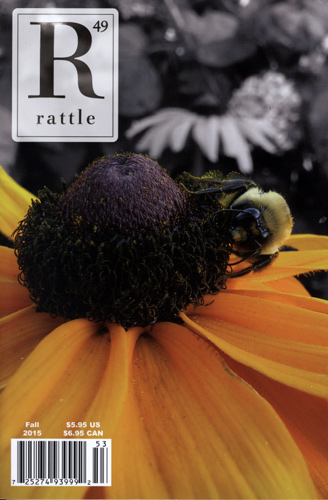Rattle – Fall 2015
If I were shipwrecked on a deserted island, I would take a machete and a subscription to Rattle. Perhaps a seagull could deliver quarterly. I’d open a coconut and start reading the conversation with the working poet that is included with each issue, then work my way randomly through the alphabetical compilation, memorizing and reciting to all my friends: the geckos, turtles, butterflies and rocks. If I lost my sanity, at least I would be happy. If I were shipwrecked on a deserted island, I would take a machete and a subscription to Rattle. Perhaps a seagull could deliver quarterly. I’d open a coconut and start reading the conversation with the working poet that is included with each issue, then work my way randomly through the alphabetical compilation, memorizing and reciting to all my friends: the geckos, turtles, butterflies and rocks. If I lost my sanity, at least I would be happy.
The Los Angeles-based Rattle has been a modern American poetry stable for twenty-one years. The Fall 2015 issue is devoted to scientists. The contributors spend their days gazing through microscopes trying to find the cure to cancer, tagging fish in Artic waters, blending into desert and jungle to count bobcats or owls. At night, they write verse. “Just as creative thinking has opened new solutions in my fisheries career, scientific thinking has directed my poetry to be more honest and examine the intricacies beyond the surface of things,” writes Katrina Outland in the contributor’s notes. Her “Cleaning” is a meditation on the slicing of fish. “One slice, anus to mouth / through shit and acid and blood / one smooth motion from whole / to empty . . . ” The anatomical details combined with controlled passion creates four powerful stanzas that allow the reader behind the fish gutter’s curtain. In Ruth Madievsky’s “Tuning Fork,” the clinical eye of a technician is also mixed with the passionate:
I feel some days like a narrowly avoided bike accident,
and on others like I have been tree-ringed
by the man who took my silence
to mean yes.
Which I guess is like asking
why the mind has a shorter memory
than the body.
Whether the language of the body
could ever fit inside a throat.
Daniel Becker’s “Joint National Commissions Galore” is four and a half pages of dagger-sharp tercets:
But a little too close for comfort is how we learn,
that’s how we know exactly where to listen.
If one day I look in one ear and out the other
I’ll never make that joke again. I’d issue the standard warning
Against going too far with the Q-tips and leave it at that.
People don’t need to know everything, all the details
This also gives the reader a peak behind the curtain, in this case, a doctor’s mind. The beauty of Rattle’s thematic focus, especially when using a common vocation, is that the reader can imagine a poetic mind at work in all walks of life. So next time you are consulting your doctor and he pauses to write a note, perhaps in place of a prescription:
There is a wisdom
in the taking up of the difficult,
even impossible questions,
for we are reminded
that we are ever fools
and thirsty.
This opening verse from Len Anderson’s “The Basic Question” is a wonderful blast-off to an enlightening issue. As I sit stranded on my deserted island, scanning the horizon for my seagull to deliver Rattle’s Spring Issue, I’ll pick up my machete and go coconut hunting, quenching my thirst with a line by Meg Eden’s “Tohoku Ghost Stories”:
my daughters were lined up like bowling pins outside the school waiting for
the earthquake





